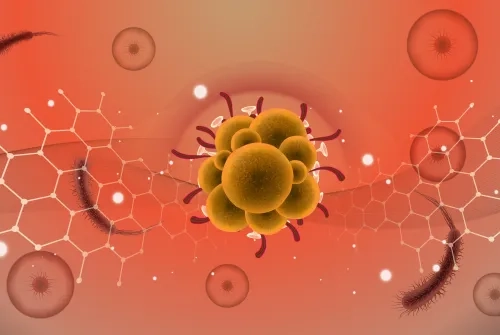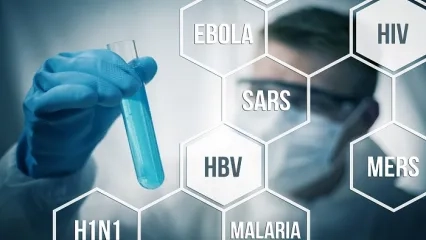Alo Yeditepe
Alo Yeditepe
What is Monkeypox Virus? What Are the Symptoms of the Monkeypox Virus?
Monkeypox virus, which is seen in the USA, Canada, and Australia after many European countries, has caused concern around the world and continues to do so.
Other cases have continued to be reported in the UK after Monkeypox was first detected in a patient arriving in London from Nigeria in May 2022. Later, case reports from different countries caused the disease to reach a new epidemic size that may pose a global epidemic threat.
Reminding that case reports from 12 countries continued to be made in the days after the first case report was made to the World Health Organization on May 13, 2022, Prof. Dr. Aynur Eren Topkaya, Head of Yeditepe University Hospitals Medical Microbiology Department and Prof. Dr. Meral Sönmezoğlu, Head of Yeditepe University Hospital Infectious Diseases and Clinical Microbiology Department, shared up-to-date information about monkeypox virus.
In Which Countries Has the Monkeypox Virus Occurred So Far?
A total of 145 cases of Monkeypox have been reported from 12 countries by May 21, 2022. There are 20 cases in the UK alone. Other countries seen are Belgium, France, Germany, Italy, the Netherlands, Portugal, Spain, Sweden, the United States (USA), Canada, and Australia, except for the European continent. 65% of these cases were reported in four countries (UK, Portugal, Spain, and Canada). The first cases in the United States were clustered in 2003 when they came into contact with domestic dogs brought from Ghana. In July 2021, a person who came to the United States from Nigeria was diagnosed and confirmed.
Is Monkeypox a New Virus?
The monkeypox virus is not new. In the UK, it was previously seen in a patient from Nigeria in 2018 and the virus was isolated. Since the genetic map of the virus isolated from a patient seen in Belgium in May 2022 was found to be the same as the 2018 case, it is thought that this year's outbreak is not with a new virus.
It was first named because it was isolated from a monkey in a laboratory in Denmark in 1958 and belonged to the same family as smallpox, which was successfully eradicated from the world by the vaccine. The first human case occurred in 1970 in a child in the Democratic Republic of the Congo. After that year, it is known as the endemic disease of Central and West Africa.
Are There Types of Monkeypox Virus?
There are two types of the virus. The rate of loss of life in the West African type, which is among the Congo region and West African types, is around 3.6% and can increase up to 10.6% in the Congo Region.
Is There a Global Pandemic Threat to the Monkeypox Virus?
Monkeypox is a zoonotic disease and is endemic in 12 countries in Africa. Between December 2021 and May 2022, 25 cases were diagnosed in Cameroon, 1238 cases in Congo, 6 cases in OAC, and 46 cases in Nigeria. Although it has not yet been fully identified as a global health threat, case reports continue to be clustered in Europe and outside the countries where it is endemic for the first time.
Monkeypox is a zoonotic disease that occurs among wild animals such as rodents and primates and is sometimes transmitted to humans. It is caused by the monkeypox virus, which belongs to the orthopoxvirus family. Most human cases have been seen in Central and West Africa, where the disease is endemic.
How is the Monkeypox Virus Transmitted?
Monkeypox can be transmitted by inhalation through contact and droplet exposure through large droplets. Human-to-human transmission occurs through skin lesions, body fluids, contact, or respiration. In 2022 cases, it was stated as a new way of transmission that attracted attention through sexual contact. This virus is not related to the Covid-19 virus, which is still being transmitted as a pandemic virus.
How Long is the Incubation Period of the Monkeypox Virus?
It is mostly 6-13 days, and it is seen to extend to 5-21 days.
What Are the Symptoms of the Monkeypox Virus?
The most important symptoms are fever, headache, muscle pain, back pain, painful swelling in the lymph nodes, and skin rashes that start after the symptoms of weakness. Rashes can be very itchy. It can form an image filled with water. Then turn into an open wound. The rash is similar to smallpox but milder. Smallpox was declared eradicated by who in 1980 and the vaccine was discontinued. Although the clinical course of the disease is milder than smallpox, it may be more severe in unvaccinated people, children, pregnant women, and immunosuppressed people.
Contagion begins with the appearance of skin rashes and continues until all lesions have healed. Symptoms are usually mild and go away on their own. Only pregnant women, children, and people whose immune system does not work well can progress heavily.
How to Diagnose Monkeypox?
In case of contact with the diagnosed patient or symptoms of the disease in people with a history of travel to endemic countries, this person is considered as a possible case. The diagnosis is usually confirmed by species-specific PCR of the material taken from the lesions, and the virus can also be detected in respiratory secretions, blood, and other fluids, including urine. Biosafety precautions should be followed for sampling and dispatch to the laboratory.
Is It Possible To Prevent Monkeypox?
The vaccine, which was discontinued in 1980, provides 85% protection against monkeypox. With the Ankara strain developed in 2019, the protection of the modified vaccine against Monkeypox Disease was found to be very high.
How to Treat Monkeypox Virus?
It is noteworthy that most of the reported cases were young males and most identified themselves as males who had sex with males. None of these cases have recently reported travel history to areas where the disease is endemic. Therefore, caution should be exercised that patients will mostly consult clinics related to sexually transmitted diseases ( Dermatology, Infectious Diseases, Urology, Gynecology, and Obstetrics).
This content was prepared by Yeditepe University Hospitals Medical Editorial Board.
”
See Also
- What is Hepatitis B? What are its symptoms? How is it Transmitted?
- What is HMPV Virus? HMPV Symptoms and Ways of Transmission
- Why Is the Flu Lasting Longer This Year?
- COVID-19 New Variant
- What is Parvovirus B19 (Fifth Disease)? What are the Symptoms of Fifth Disease?
- What Precautions Should Be Taken Against the Cold Epidemic?
- Don't Be Late Fighting Against Diseases
- Antibiotics Kill Beneficial Bacteria, Not Viruses
- What is Antibiotic Resistance?
- What is Hepatitis? What are the Symptoms and Treatment Methods?
- Symptoms and Treatment of Tick Bites
- Summer Infections
- Precautions Must Be Taken Against Loss of Life Due To Infection in Thalassemia
- Information on H1N1 (Swine Flu)
- Summer is Coming... Beware of food poisoning!
- The Way to Prevent the HIV Pandemic Can Be Made with Awareness
- Our Taboos Affect the Increase in the Number of HIV-Positive Cases in Turkey
- Strep A Symptoms and Treatment
- Do Not Put a Cigarette Butt or Pour Olive Oil or Liquid Soap on the Tick
- Reheat the Food You Cooked Only Once!
- HIV Can Be Hidden for 10 Years without Any Symptoms!
- 290 Million People Live Without Knowing They Have Hepatitis
- Things to Consider When Touching Meat at Eid
- What Is Anthrax Disease?
- The Way to Fight AIDS is to Raise Awareness First
- Still Not Too Late For Flu Vaccine
- What is Rhinovirus?
- Fighting with Thalassemia: Meral Yılmaz
- Thalassemia Spreads from the Mediterranean to the Whole of Europe with Migration!
- Early Treatment of Crimean Congo Hemorrhagic Fever is Vital
- Approximately 3 Million Patients Need Blood Transfusions Every Year in Turkey
- When to Get the Flu Vaccine
- Antibiotics Account For 14% of Prescription Costs
- West Nile Virus Replaces Malaria
- It Is Necessary to Try to Be Healthy in order to Be Protected
- A New Flu Outbreak is Expected Every 10 Years
- 63% of Vector-Borne Diseases are Caused by Lyme Disease
- Experts Warn About Flu Risk
- Do Not Run Away From the Vaccine! The Coronavirus Itself Is More Dangerous Than The Side Effects of The Vaccine...
- Mosquito Infection Risk
- Why aren’t Antibiotics Working Any More?
- What Should be Paid Attention to in Face-to-Face Education?
- The World Raises an “Alarm” on Antibiotic Resistance!
- What is COVID-19?
- The Mask Requirement was Removed and the Importance of Social Distance Increased!
- How to Prevent COVID-19 in School-Going Children
- Flu Is Widely Seen This Year
- WHO (World Health Organization) Warns for Antibiotic Resistance!
- Attention! Holiday Return Cases May Increase
- Who Is Threatened by Monkeypox?
- Why Do Mosquitoes Bite Some People More?
- Ways to Prevent Coronavirus
- Swine Flu / H1N1
- Life Returns to Normal with Caution
- What is Lyme Disease?
- Symptoms and Treatment of Sepsis
- How to Tell if You Have a Mild Coronavirus?
- Pay Attention to These Rules for COVID-19
- Is it Necessary to Disinfect Outdoors?
- Can the Coronavirus Be Transmitted Through What We Eat?
- Hand Sanitizer Usage Guide
- Use of Gloves During the Pandemic
- Frequently Asked Questions About Coronavirus
- Catching Coronavirus
- Multiple Tests Are Available for COVID-19
- The Priority Rule for the Protection from Summer Infections is Hygiene
Alo Yeditepe




